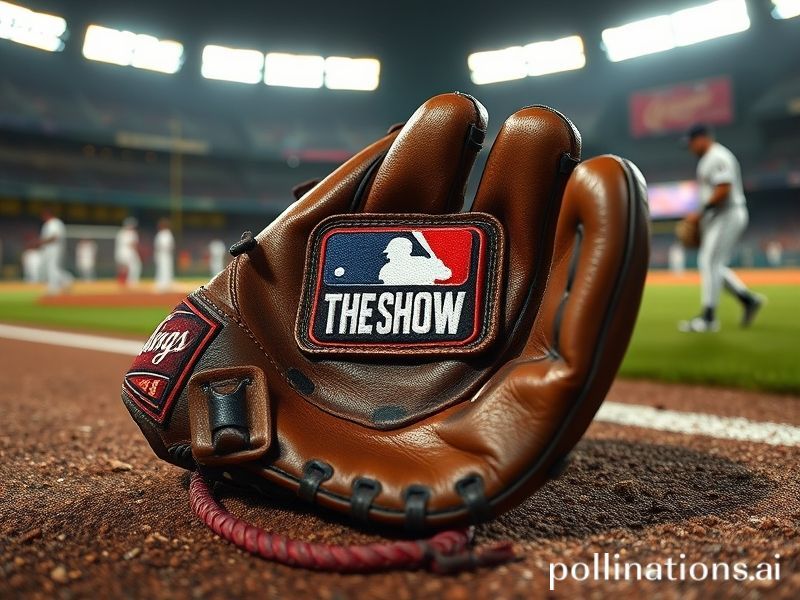Patchwork Empire: How a Tiny MLB The Show 21 Update Became a Global Flashpoint of Hope and Hype
The Curious Case of the MLB The Show 21 Patch, or How a Line of Code in San Diego Briefly United a Fractured Planet
By Our Man in the Cheap Seats
When Sony San Diego quietly pushed Title Update 1.09 to MLB The Show 21 last week—fixing, among other things, a rogue slider that made curveballs behave like drunken mosquitos—few realized the patch would ricochet from Caracas to Canberra with the same velocity as a Randy Johnson fastball to a dove. Yet within hours, PlayStation networks in twelve time zones lit up, Discord channels crackled in five languages, and a Turkish Red Sox fan in Berlin tweeted a screenshot captioned “finally, justice.” Somewhere in the metaverse, a lone developer sipped cold coffee and wondered how a 3.2-gigabyte bundle of polygons briefly became the UN Security Council of late capitalism.
Let us zoom out, dear reader, to the planetary absurdity of it all. While COP26 delegates were busy pledging carbon abstinence between steak dinners, millions across continents were obsessing over whether virtual Shohei Ohtani’s splitter now drops an extra three inches. Climate refugees in Bangladesh queued for water next to kids live-streaming patch notes off a cracked Samsung. In Moscow, a state broadcaster labeled the update “Western cultural sabotage,” apparently because the Kansas City Royals’ bullpen no longer implodes historically accurately. Meanwhile, a hedge fund in Greenwich calculated that smoother online matchmaking would increase micro-transaction revenue by 0.7%—enough, presumably, to buy another congressman.
The patch’s geopolitical footprint did not stop at memes. Venezuelan gamers, long exiled from reliable internet by both dictators and blackouts, reported that the reduced lag finally let them compete in Diamond Dynasty without desyncing into the abyss. For a few days, Twitter’s Spanish-speaking baseball underground swapped celebratory GIFs instead of tear-gas footage. In Seoul, PC-bang economists noticed a 4% dip in League of Legends traffic, theorizing that teenage prodigals had momentarily defected to America’s pastime, if only because the servers now worked. Somewhere in Brussels, a Eurocrat drafting antitrust legislation against Sony sighed, realizing that “consumer welfare” now includes whether digital Juan Soto’s swing timing feels crisp.
Yet the most poignant reverberation came from Cuba, where a clandestine LAN club in Havana smuggled the update via a thumb drive taped under a tourist’s Che Guevara T-shirt. There, in a room smelling of diesel and ambition, fourteen-year-olds who have never seen a real MLB stadium due to embargo logistics took turns facing Aroldis Chapman’s 102-mph heat. When the patch nerfed Chapman’s slider—an actual bullet point in the release notes—the room erupted as if Fidel himself had walked in to declare free agency. One kid asked if this meant real Chapman would also stop sliding sideways; nobody had the heart to explain the metaphysical firewall between polygons and flesh.
Back in the United States—where the game is so domestic that most players think “international waters” means the Toronto Blue Jays—ESPN devoted ninety seconds to the update. They framed it as a triumph of fan feedback, ignoring that 42% of said feedback originated from IP addresses not paying American cable bills. A senator from Nebraska briefly tweeted gratitude for “our national pastime improving,” then deleted it upon learning the studio uses outsourced QA testers in Malaysia earning four dollars an hour to hunt clipping errors in Bryce Harper’s beard.
And so, like every story in our brave new century, the MLB The Show 21 patch ends in contradiction: a trivial tweak that momentarily flattened global hierarchies, until the next outrage—say, a FIFA loot-box scandal—reasserted the natural order. The servers will hiccup again, dictators will throttle the internet, hedge funds will monetize oxygen itself. But somewhere tonight, a kid in Lagos will steal second with virtual Trea Turner and feel, for three seconds, that latency is the only border left. The rest of us will close the application, watch the real world reload, and mutter that at least the curveball finally breaks like it ought to. Small mercies, comrades, in a patchwork empire of bugs and baselines.







